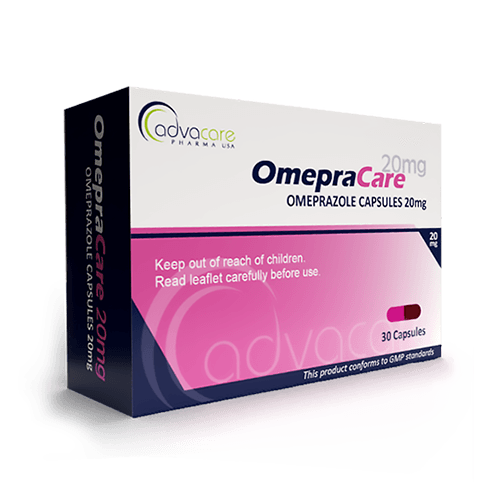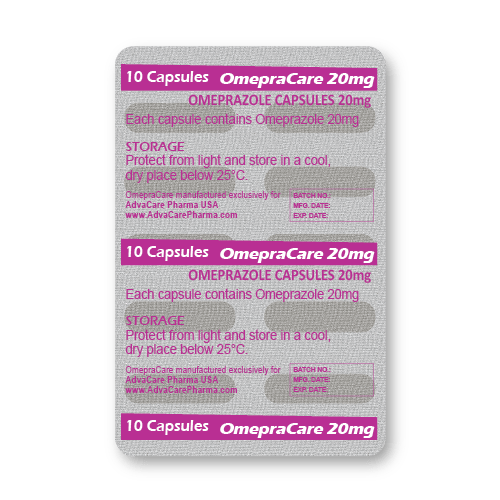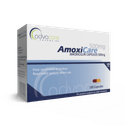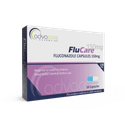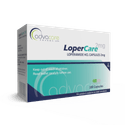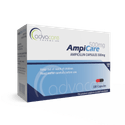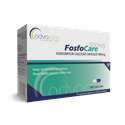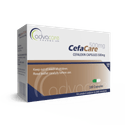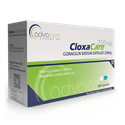- Home›
- Pharmaceuticals›
- Capsules›
- Omeprazole Capsules
Omeprazole Capsules
Dosage
Packaging
What is Omeprazole?
Active Ingredients: Omeprazole
Omeprazole Capsules are a drug used to lower stomach acid production. It is indicated for the treatment of stomach and esophagus conditions, like acid reflux disease and esophagitis. It relieves the symptoms, like heartburn, coughing, and difficulty swallowing, that are associated with these conditions.
Omeprazole Capsules and Omeprazole for Injection are used to help prevent and heal gastric ulcers. This medication can be used together with antibiotics to treat gastric ulcers caused by infection with Helicobacter pylori (H. pylori). It may also be prescribed to help prevent esophageal cancer.
Omeprazole belongs to the class of antisecretory compounds known as substituted benzimidazoles and was originally approved by the FDA in 1989 as a proton-pump inhibitor (PPI). It inhibits the H+/K+ ATPase enzymatic system, therefore blocking acid from being secreted into the stomach. PPIs typically take up to 4 days to reach full efficiency.
AdvaCare Pharma is a GMP and ISO-certified manufacturer and exporter of Omeprazole Capsules. We offer a wide range of high-quality and cost-effective medications that are available for distribution. Our pharmaceutical products are manufactured in our facilities in China, India, and the USA.
Why are we a quality Omeprazole manufacturer?
AdvaCare Pharma is a GMP manufacturer of Omeprazole Capsules. Our strategically located facilities ensure that our company has complete control over the supply chain, meaning higher quality products and lower costs for production, transportation and importation. Over the past 20 years, we have built a solid reputation as a leading Omeprazole manufacturer, one of the 60+ products we manufacture in capsule dosage form, across 65 countries where our pharmaceutical products are distributed.
Uses
What is Omeprazole used for?
Omeprazole is indicated for the following uses:
- Short-term treatment (4-8 weeks) of active benign peptic (gastric, duodenal, esophageal) ulcers caused by excessive gastric acid in adults.
- Eradication of H. pylori bacterial infection in combination with antibiotics to treat and reduce recurrence of duodenal ulcers in adults.
- Treatment of gastroesophageal reflux disease (GERD) in adults and pediatric patients (≥ 1 year).
- Treatment of dyspepsia (indigestion), heartburn, and other symptoms associated with GERD in adults and pediatric patients (≥ 1 year).
- Short-term treatment (4-8 weeks) of erosive esophagitis that has been diagnosed by endoscopy in adults and pediatric patients (≥ 1 month).
- Maintain healing (≤ 12 months) of erosive esophagitis in adults and pediatric patients (≥ 1 year).
- Long-term treatment of pathological hypersecretory conditions (e.g., Zollinger-Ellison syndrome, multiple endocrine adenomas, systemic mastocytosis) in adults.
- Reduce risk of upper gastrointestinal (GI) bleeding in critically ill adult patients.
How should Omeprazole Capsules be used?
This medication is manufactured to be taken orally. Typically, Omeprazole Capsules are taken in the morning before meals or on an empty stomach. For those unable to swallow capsules, the contents may be added to applesauce or pudding and swallowed without chewing.
Omeprazole Capsules should be used for the full prescribed length of time, even if symptoms quickly improve, and especially if it has been prescribed with antibiotics. After completion of treatment, at least 4 months should pass before a new treatment with Omeprazole Capsules is initiated.
What dose should be taken and for how long?
Adults Dosage may vary based on different medical indications:
- Short-term treatment of active duodenal ulcer, the recommended dose is 20mg once daily for 4-8 weeks.
- Short-term treatment of active, benign gastric ulcer, the recommended dose is 40mg once daily for 4-8 weeks.
- Treatment of H. pylori infection with dual therapy, the recommended dose is 40mg once daily for 14 days. For treatment with triple therapy, the recommended dose is 20mg twice daily for 10 days.
- Short-term treatment of GERD and its associated symptoms, the recommended dose is 20mg once daily for up to 4 weeks.
- Short-term treatment of dyspepsia, the recommended dose is 20mg once daily for up to 14 days.
- Short-term treatment of erosive esophagitis, the recommended dose is 20mg daily for 4-8 weeks.
- Maintenance of healing of erosive esophagitis, the recommended dose is 20mg daily for length of treatment prescribed.
- Long-term treatment of pathological hypersecretory conditions (e.g., Zollinger-Ellison syndrome, multiple endocrine adenomas, systemic mastocytosis), the initial recommended dose is 60mg once daily with a maximum dose of 360mg/day (divided into 120mg, three times a day).
Children (1 month - < 1 year) Short-term treatment of erosive esophagitis for up to 6 weeks, the recommended once-daily dose based on weight is 2.5mg (3 - < 5kg), 5mg (5 - < 10kg), and 10mg (≥ 10kg).
Children (1 - 17 years) Short-term treatment of GERD and its associated symptoms for up to 4 weeks, the recommended once-daily dose based on weight is 5mg (5 - < 10kg), 10mg (10 - < 20kg), and 20mg (≥ 20kg).
Short-term treatment of erosive esophagitis for 4-8 weeks, the recommended once-daily dose based on weight is 5mg (5 - < 10kg), 10mg (10 - < 20kg), and 20mg (≥ 20kg).
Maintenance of healing of erosive esophagitis for 4-8 weeks, the recommended once-daily dose based on weight is 5mg (5 - < 10kg), 10mg (10 - < 20kg), and 20mg (≥ 20kg) for length of prescribed treatment.
Refer to a doctor or pharmacist for more specific guidelines on dosage. Do not exceed what they advise.
Who can use Omeprazole?
Omeprazole can be administered to adults and children (≥ 1 year), but caution is advised for specific groups of patients.
Pregnant Omeprazole is a category C pregnancy risk. Animal studies show potential risk and human studies are inadequate, however studies published after its categorization show no risk of adverse pregnancy outcomes.
Animal studies have revealed evidence of dose-related increases in embryo death, fetal resorptions, and pregnancy disruptions. Animals given exceedingly large doses experienced toxicities during embryo fetal and postnatal development. Major fetal malformations were not frequently observed in animal models.
Studies in pregnant people taking omeprazole have not demonstrated likely risk of major malformations. Omeprazole is likely safe to use during pregnancy, but caution is still advised.
Nursing Omeprazole is likely excreted in human milk in small amounts. The effects of omeprazole on a nursing infant are currently unknown. The benefits of breastfeeding, the potential benefits of omeprazole for the patient, and any potential adverse effects on a nursing infant should all be considered.
Pediatric The recommendations for dosage adjustments for children are as follows:
- In pediatric patients < 1 month, the safety and efficacy of prescription formulations have not been established.
- In pediatric patients < 18 years, the safety and efficacy of the over-the-counter (OTC) formulation have not been established.
The safety profile in pediatric patients was similar to that in adults. Adverse reactions related to the respiratory system and accidental injury were most frequently reported in the 2-16 year age group.
Geriatric The safety profile of omeprazole in adults ≥ 65 years old was similar to that of adults < 65 years old.
Compared to younger adults, the elimination rate of omeprazole was somewhat decreased, and its bioavailability was increased in older patients. The plasma clearance of omeprazole in older patients was about half that of younger adults, and its half-life was about twice that of younger adults. A dosage reduction in older patients may be necessary.
Other warnings
In patients with hepatic impairment, dosage should be reduced, particularly for the maintenance of healing of erosive esophagitis.
In patients with renal impairment, no dose reduction is necessary.
Patients of Asian descent may require dosage reduction, particularly for the maintenance of healing of erosive esophagitis, as evidence of significantly higher bioavailability was found when compared to Caucasian individuals.
Omeprazole’s reduction of gastric acid secretion elevates gastric pH, resulting in a significant increase in the concentrations of viable bacteria after 14 days of treatment. These bacterial changes typically resolve within 3 days of treatment cessation.
Side Effects
As with all pharmaceuticals, some unwanted effects can occur from the use of Omeprazole Capsules.
Common side effects include, but may not be limited to:
- nausea
- vomiting
- headache
- constipation
- increased intestinal gas, bloating and flatulence
- abdominal pain
- fever and cold symptoms (especially in children)
Seek medical attention if the following develop:
- allergic reaction
- fast, slow, or irregular heartbeat
- muscle spasms or seizures
- new or unusual pain in the wrist, thigh, hip, or back
- persistent diarrhea or blood in the stool
- blurred vision
- confusion
- seizures
- chest pain
Prolonged use of PPIs like omeprazole may be associated with an increased risk of Clostridium difficile-associated diarrhea and certain infections of the stomach or intestines.
For a comprehensive understanding of all potential side effects, consult a medical professional.
If any symptoms persist or worsen, or you notice any other symptoms, please call your doctor immediately.
Precautions
Do NOT use Omeprazole Capsules if:
- You have liver disease.
- You have frequent chest pain, heartburn, or wheezing.
- You are hypersensitive or allergic to omeprazole, similar PPIs (esomeprazole, lansoprazole, pantoprazole), or any of the inactive ingredients in these capsules.
Caution should be exercised when using Omeprazole Capsules if:
- You are also taking rilpivirine to treat HIV.
- You have hypomagnesemia and/or a vitamin B12 deficiency or are on medications that could result in them.
- You are taking digoxin, clopidogrel, methotrexate, St. John's wort, diuretics, or antibiotics.
Long-term use of omeprazole, especially at high doses and for extended periods, may be associated with a slightly increased risk of bone fractures.
Possible interactions may occur with other pharmaceutical products. Consult with a doctor or pharmacist about any medications and supplements you are taking before beginning treatment.
References
Efficacy and Safety of Omeprazole for the Treatment of Acid Peptic Disorders: A Systematic Review and Meta-Analysis
The main objective of this study was to compare the efficacy of omeprazole to other proton-pump inhibitors (PPIs) or placebo for the treatment of acid peptic disorders (APDs). This research included studies from different databases in which the efficacy was analyzed separately for erosive and non-erosive diseases.
It included 10,539 participants from 12 articles and it was found that omeprazole significantly improved heartburn compared to placebo (RR = 2.47, 95% CI: 2.13 and 2.86, and p < 0.001) and was equivalent to the other five types of PPI. It is also concluded that omeprazole is the most cost-effective PPI.
The conclusion is that this PPI is significantly better than placebo and is efficient in curing ulcers and erosions in cases of APDs.

You might be interested in...
Why AdvaCare Pharma?
As an industry leader, we are aware of our responsibility to provide affordable and sustainable solutions to improve healthcare worldwide.
